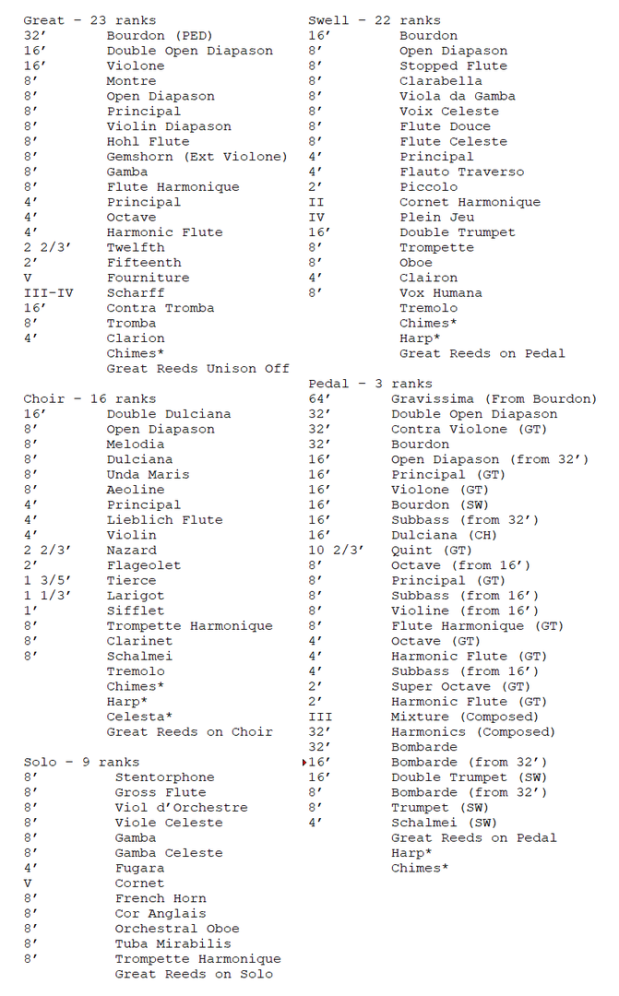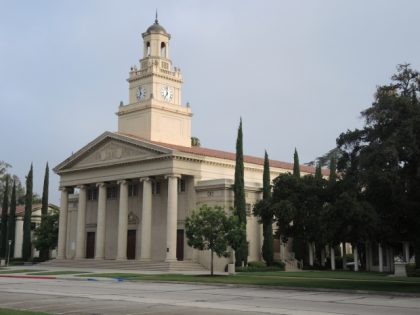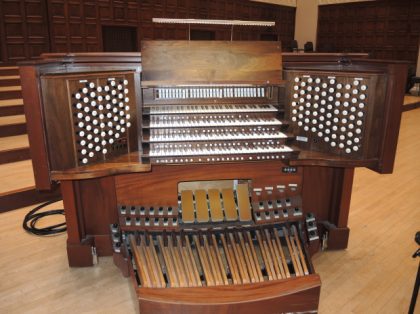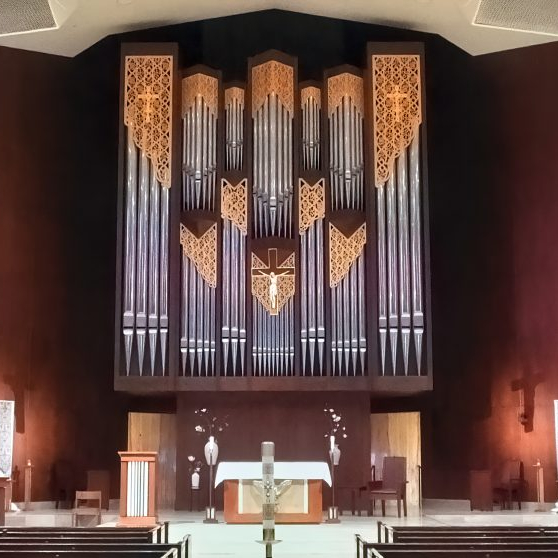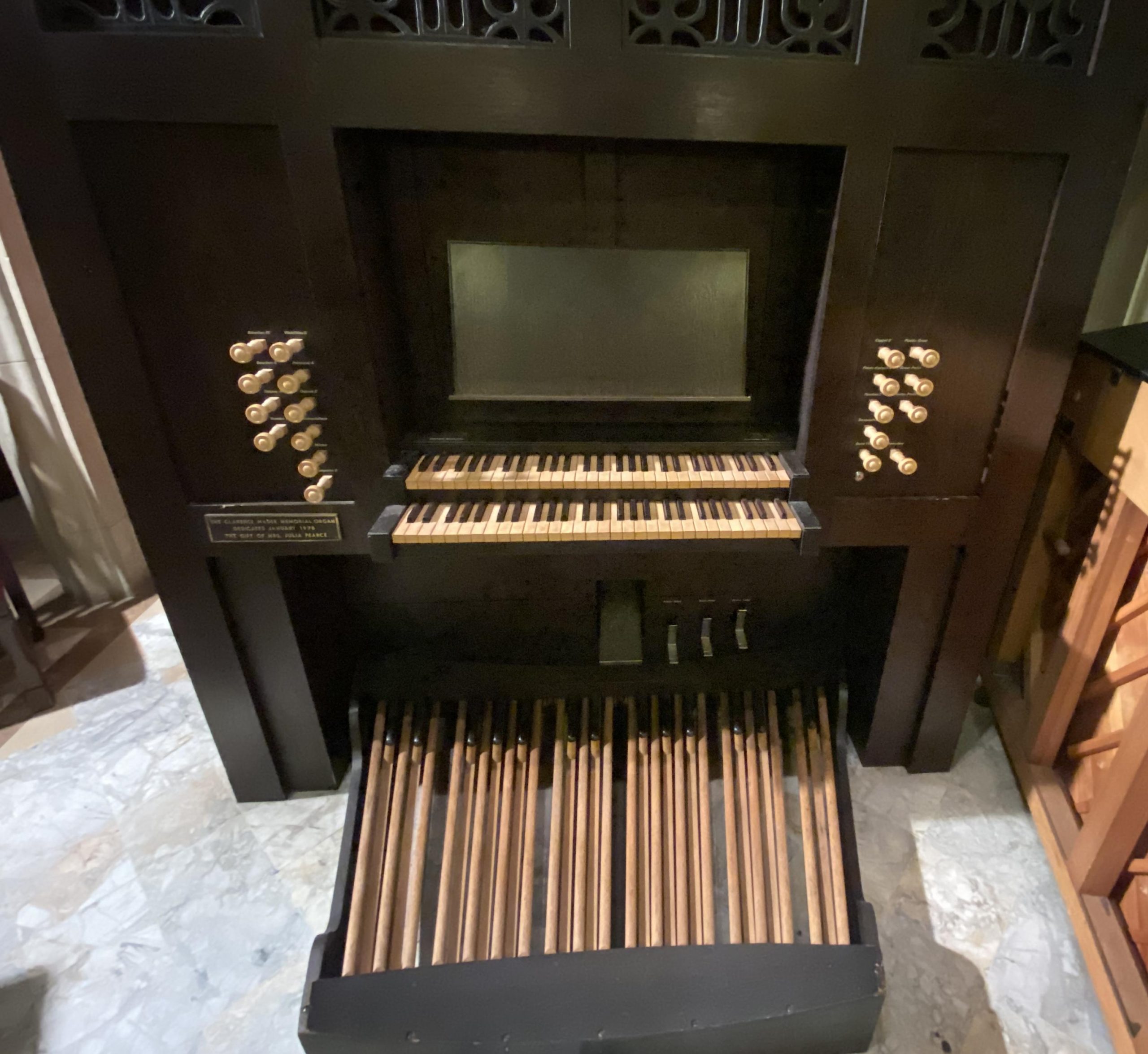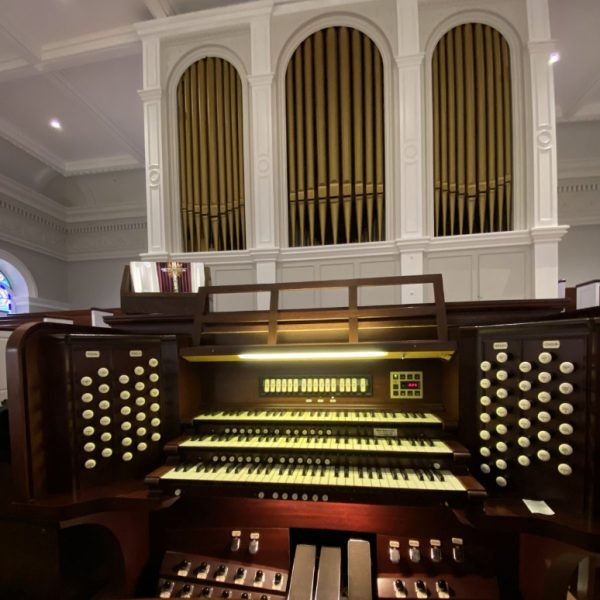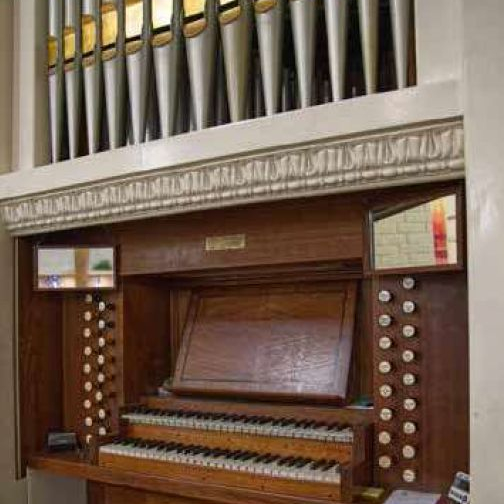Redlands University | Redlands, CA
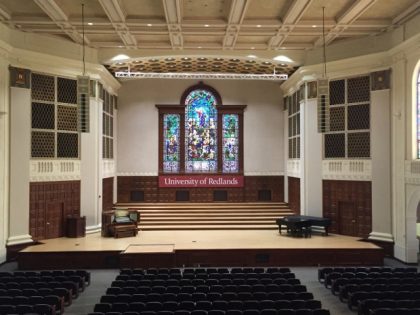 An anonymous gift to the university, the Casavant Frères Organ Opus 1230 was dubbed “unsurpassed in the West” with its 4,266 pipes, 66 sounding stops, 61 ranks and a 1,500-pound console. On September 27, 1926, Business Manager George P. Cortner wrote to Casavant Frères explaining that the University was building a chapel to seat fifteen hundred people and that they were interested in a “four manual organ including harp, chimes and probably (an) echo organ.” He described Redlands as a “most beautiful city of fifteen thousand…it has been known not only for its beauty but also far its culture. It is a music-loving city.” “We do not care for a great many of accessories such as go with a moving picture organ. We wish an organ of sufficient volume to fill our auditorium. We are very anxious as to the quality of the tone…as we wish every pipe to answer its specific purpose and not be used for three or four different stops.” The response from Casavant came from Stephen Stoat who would soon become the Tonal Director of the firm. Since it was Casavant’s general practice to build instruments with a more classical approach, the request to avoid unnecessary unification and theatre organ accessories was immediately understood and appreciated. Mr. Stout prepared a specification for a four manual organ of fifty-eight ranks distributed over Great, Swell, Choir and Solo divisions. This specification was sent to Professor Charles Howard Marsh who was studying with Marcel Dupré in Paris. On January 4, 1927, Mr. Marsh wrote to Mr. Stoat, “I have your letter of December 18 enclosing (the) specification for the proposed organ at Redlands…In fact, I have just written Mr. Cortner the strongest letter I can, urging him by all means to accept your proposition, which I honestly believe to be superior to anything he could get for the money in the U.S. I have tried to explain to him the superiority of the Casavant materials, workmanship and voicing over all American makers with the possible exception of Skinner—and inasmuch as you are offering a better balanced organ than Skinner, hope the University will follow my advice and give you the contract.” “The addition of a harp stop would be very simple…one suggestion I would like to make and that is the addition of a French Horn to the Solo… showed this specification to M. Marcel Dupré…and (he) confirmed my own beliefs in the superior quality of the Casavant organ. I asked him about the addition of a French Horn and…he assured me that you could build a French Horn very similar and just as effective as the French Horn that Skinner builds. I have also talked with M. Dupré about the style of the console and he thinks as I do, the French style of stop-knobs in steps or terraces are preferable. I am suggesting this to Mr. Cortner also.” On February 11, 1928, following completion of the instrument, Mr. Cortner wrote, “We wish to express to you our appreciation for the quality of the instrument which, we feel, in every sense of the word, is a first class organ.” In November of the some year, University Organist Arthur Poister expressed his appreciation, “I am enjoying tremendously the greatness and the finesse of this lovely instrument.” Opus 1230 was the third, and largest Casavant organ installed in California in 1927. Delivered to campus in December 1927, the organ took five weeks to install and tune before the February 19, 1928 dedication of the Memorial Chapel. At the February 28, 1928 dedication of the Casavant, Pietro A. Yon, a renowned composer and Vatican organist, played the opening recital. As the music reverberated throughout the Chapel nave, the power of the “king of instruments” was felt by all. Throughout seven decades, the Casavant has been a centerpiece both on campus and in the Redlands community. It is played at all major university events including the enduringly popular Feast of Lights, is integral to the School of Music education program and is showcased every spring in the Redlands Organ Festival. As part of the 2002-03 restoration of the Memorial Chapel, the university undertook a $650,000 project to repair and restore the organ to its original grandeur
An anonymous gift to the university, the Casavant Frères Organ Opus 1230 was dubbed “unsurpassed in the West” with its 4,266 pipes, 66 sounding stops, 61 ranks and a 1,500-pound console. On September 27, 1926, Business Manager George P. Cortner wrote to Casavant Frères explaining that the University was building a chapel to seat fifteen hundred people and that they were interested in a “four manual organ including harp, chimes and probably (an) echo organ.” He described Redlands as a “most beautiful city of fifteen thousand…it has been known not only for its beauty but also far its culture. It is a music-loving city.” “We do not care for a great many of accessories such as go with a moving picture organ. We wish an organ of sufficient volume to fill our auditorium. We are very anxious as to the quality of the tone…as we wish every pipe to answer its specific purpose and not be used for three or four different stops.” The response from Casavant came from Stephen Stoat who would soon become the Tonal Director of the firm. Since it was Casavant’s general practice to build instruments with a more classical approach, the request to avoid unnecessary unification and theatre organ accessories was immediately understood and appreciated. Mr. Stout prepared a specification for a four manual organ of fifty-eight ranks distributed over Great, Swell, Choir and Solo divisions. This specification was sent to Professor Charles Howard Marsh who was studying with Marcel Dupré in Paris. On January 4, 1927, Mr. Marsh wrote to Mr. Stoat, “I have your letter of December 18 enclosing (the) specification for the proposed organ at Redlands…In fact, I have just written Mr. Cortner the strongest letter I can, urging him by all means to accept your proposition, which I honestly believe to be superior to anything he could get for the money in the U.S. I have tried to explain to him the superiority of the Casavant materials, workmanship and voicing over all American makers with the possible exception of Skinner—and inasmuch as you are offering a better balanced organ than Skinner, hope the University will follow my advice and give you the contract.” “The addition of a harp stop would be very simple…one suggestion I would like to make and that is the addition of a French Horn to the Solo… showed this specification to M. Marcel Dupré…and (he) confirmed my own beliefs in the superior quality of the Casavant organ. I asked him about the addition of a French Horn and…he assured me that you could build a French Horn very similar and just as effective as the French Horn that Skinner builds. I have also talked with M. Dupré about the style of the console and he thinks as I do, the French style of stop-knobs in steps or terraces are preferable. I am suggesting this to Mr. Cortner also.” On February 11, 1928, following completion of the instrument, Mr. Cortner wrote, “We wish to express to you our appreciation for the quality of the instrument which, we feel, in every sense of the word, is a first class organ.” In November of the some year, University Organist Arthur Poister expressed his appreciation, “I am enjoying tremendously the greatness and the finesse of this lovely instrument.” Opus 1230 was the third, and largest Casavant organ installed in California in 1927. Delivered to campus in December 1927, the organ took five weeks to install and tune before the February 19, 1928 dedication of the Memorial Chapel. At the February 28, 1928 dedication of the Casavant, Pietro A. Yon, a renowned composer and Vatican organist, played the opening recital. As the music reverberated throughout the Chapel nave, the power of the “king of instruments” was felt by all. Throughout seven decades, the Casavant has been a centerpiece both on campus and in the Redlands community. It is played at all major university events including the enduringly popular Feast of Lights, is integral to the School of Music education program and is showcased every spring in the Redlands Organ Festival. As part of the 2002-03 restoration of the Memorial Chapel, the university undertook a $650,000 project to repair and restore the organ to its original grandeur
Encryption
The samples are offered in 48kHz/24bit resolution. The multiple releases have 2 or 3 levels: short, mid and long. Hauptwerk 5 and higher required (incl. HW6). The sample set is encrypted via the iLok system used in Hauptwerk
The sample set is offered in a 4-channel variant (Close-Ambient), both perspectives show the reverb very well and are very clear, the ambient sound is not quite as focused, but not at the expense of clarity. It would be possible in order to save memory to load only one perspective, and still get a very good impression of the room. Sliders are provided to allow for mixing the perspectives to your taste.
Reverb time
The reverb time is up to 2.5~3 seconds.
Keyboards, pedalboards
The original compass: keyboards - 61 notes, pedal division - 32 notes. Several stops have 73 notes, those are faithfully sampled and included.
Requirements
RAM consumption (4-channel)
- 16-bit, compressed, all releases, single loops: ~20 GB
- 20-bit, compressed, all releases, single loops: ~25 GB (recommended)
- 24-bit, compressed, all releases, single loops: ~30 GB
Sampleset Interface
** Special thanks to Christoph Schmitz for creating the beautiful screens and his programming expertise, enabling special features such as the GT/CH manual swap and countless others.
All of our updates are cumulative, so you don't have to remember what order to apply them in... simply download and install (choose "Upgrade"option).
Click HERE to download the most recent update
